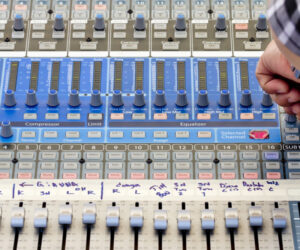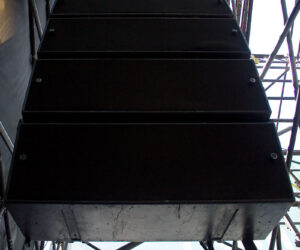This explosion of the digital sound reinforcement product sector over the last half-decade or so has produced a tempting array of solutions.
I’ve watched these developments carefully, worked with most of the offerings, and seen other companies utilize these powerful tools to great benefit.
My sound company recently started looking for a set of new consoles to support our expanding activities, so I began talking in earnest with manufacturers over what they could offer me in return for my money.
After carefully weighing a number of factors, I’ll be taking delivery of an analog VCA console from the great folks at APB-DynaSonics, headquartered in New Jersey.
This article briefly explains my decision to buy an analog mixing console in today’s market and why I’m pretty sure I’m not insane for having done so (contrary to the opinions of many!).
“But Bennett! How could you resist the allure of the brand new Hobart R2CZ?” Let me assure you, it was a difficult decision.
First of all, I’m not buying analog, or writing this article, because I hate digital. I’m a well-known advocate of DSP and the flexibility available in essentially every digital mixer. I’ve got racks full of the stuff myself; it’s great problem solving equipment that I use on nearly every show.
The issue here isn’t one of whether or not digital is a good thing, but one of whether or not it’s the right decision at this point in time for my company.
One of my first considerations when I began this hunt was budget. I discovered early on that I could sink around $10-$20,000 into a new mixing board. This immediately narrowed my possibilities. If I’d had $40,000 to spend, or $4,000 to spend, my decision to buy analog might have been different.
I’m sure I’m not alone in looking into a new desk at this price point, and I think my observations are valid for many small sound companies.
I won’t try to dodge the issue; one of the main reasons I’m staying analog is sound quality. I don’t side with people who believe digital audio equipment automatically sounds like junk. I’ve heard too much fine sounding digital gear for that to be true.
However, digital consoles in the price range I can afford have often left something to be desired in my opinion. Any time you pack that much complexity and power into something so compact and affordable, quality compromises have to be made.
The analog desk I have acquired has some of the cleanest, clearest sound output I have ever heard, and what’s more, it continues to sound good even if you abuse it with excessive levels or radical EQ. I have no qualms about putting this desk on any show, at FOH or monitors, headliner or opener, acoustic or rock.
Hand in hand with sound quality goes ease of use. My company works with a lot of artists and many other companies throughout each year. While I am fairly comfortable mixing on nearly anything, I’m not buying just for me. This console is going to be used by BE’s hot off the bus, late for sound check.
The last thing they or I need to be doing at that juncture is learning yet another user interface. With an analog layout, every switch and knob is in plain sight, they’re all labeled, and if you’ve seen one VCA console you can pretty much work with any of them.
True, at the end of the night I’ll be resetting most of those controls by hand one at a time, but at least I know where they are and what they need to be reset to.
The choice of an analog board was also driven by my need for a reliable, easily repaired mixer that would still be with me a decade from now. I don’t have enough equipment that I can afford to let some of it sit around the shop being repaired and this board in particular is too large an investment not to pull its weight at every show I book.
Therefore, reliability during and after the gig is an enormous issue in my mind. I always carry a spare console in case of failure, of course, but there’s no way I can afford to carry a spare identical console. If my FOH desk goes down, I’ll be finishing the show on something considerably less capable and probably rack-mounted. I’d like to avoid that, for obvious reasons, so I take reasonable steps to avoid console failure.















